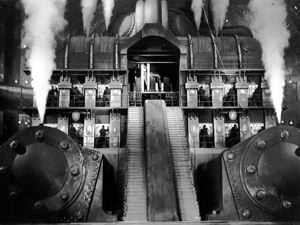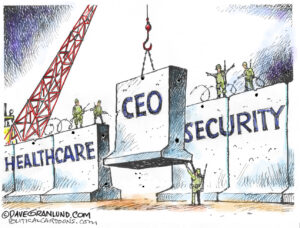The Dirty Secret of the Jobless Recovery
Have you ever asked yourself what makes a "jobless recovery" possible? Since the beginning of the recession, American companies have trimmed their staffs and shifted work to remaining employees, largely without increasing pay, and those workers are not reaping the benefits. (more)
Have you ever asked yourself what makes a “jobless recovery” possible? Since the beginning of the recession, American companies have trimmed their staffs and shifted work to remaining employees, largely without increasing pay, and those workers are not reaping the benefits. On the contrary, while employed Americans have labored to make their industries more productive than they were before — to the tune of a 22 percent increase in corporate profits — the majority of those gains have gone to company executives and those involved in the financial services industry.
The article below evokes the famous “Let ’er roll!” scene from “I Love Lucy” in which Lucille Ball and Vivian Vance are made to wrap chocolates at impossibly accelerating speeds. But this clip from Fritz Lang’s “Metropolis” captures the true mental and physical cost paid by employees forced to work longer, harder, faster and smarter than should be required of them. –ARK
Your support is crucial...Mother Jones:
Mind racing at 4 a.m.? Guiltily realizing you’ve been only half-listening to your child for the past hour? Checking work email at a stoplight, at the dinner table, in bed? Dreading once-pleasant diversions, like dinner with friends, as just one more thing on your to-do list?
Guess what: It’s not you. These might seem like personal problems—and certainly, the pharmaceutical industry is happy to perpetuate that notion—but they’re really economic problems. Just counting work that’s on the books (never mind those 11 p.m. emails), Americans now put in an average of 122 more hours per year than Brits, and 378 hours (nearly 10 weeks!) more than Germans. The differential isn’t solely accounted for by longer hours, of course—worldwide, almost everyone except us has, at least on paper, a right to weekends off, paid vacation time (PDF), and paid maternity leave. (The only other countries that don’t mandate paid time off for new moms are Papua New Guinea, Sierra Leone, Liberia, Samoa, and Swaziland. U-S…A?)
… In all the chatter about our “jobless recovery,” how often does someone explain the simple feat by which this is actually accomplished? US productivity increased twice as fast in 2009 as it had in 2008, and twice as fast again in 2010: workforce down, output up, and voilá! No wonder corporate profits are up 22 percent since 2007, according to a new report by the Economic Policy Institute. To repeat: Up. Twenty-two. Percent.
As we navigate an uncertain 2025, with a new administration questioning press freedoms, the risks are clear: our ability to report freely is under threat.
Your tax-deductible donation enables us to dig deeper, delivering fearless investigative reporting and analysis that exposes the reality beneath the headlines — without compromise.
Now is the time to take action. Stand with our courageous journalists. Donate today to protect a free press, uphold democracy and uncover the stories that need to be told.






You need to be a supporter to comment.
There are currently no responses to this article.
Be the first to respond.